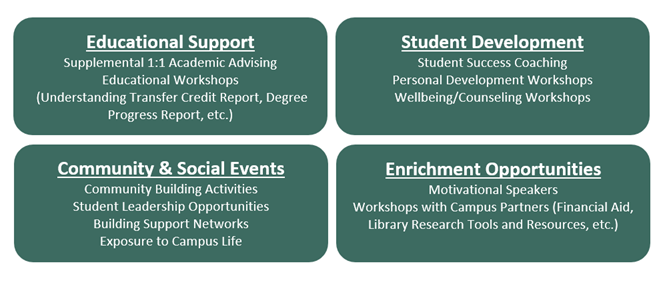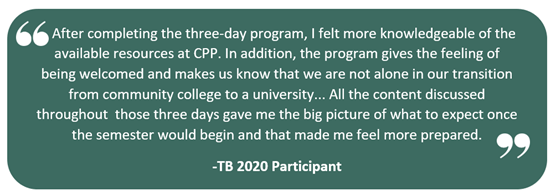
Educational Opportunity Program, Transfer Bridge: A Transfer Student Transition Program
Student Success Orientation, Transition and Retention Graduate Mid-Level New Professional Senior Level
May 10, 2021
Often when we think about transitioning to college, many university efforts target the first-time freshmen experience. As a comprehensive support program, the Educational Opportunity Program (EOP) at Cal Poly Pomona (CPP) has established a strong record of providing low-income and first-generation college students with admissions assistance, supplemental advising, success coaching, tutoring, community engagement opportunities, and college success seminars. Over the last decade, EOP at CPP has experienced increasing enrollment rates of students transferring from community college. Due to this increase, EOP efforts were adjusted to address the unique challenges and needs of transfer students. Thus, in 2008, introducing group advising to specifically target the academic needs of EOP transfer students and in 2013, re-establishing a Transfer Bridge (TB) program.
The mission of Transfer Bridge is to provide a wide range of educational, personal, social, and cultural enrichment opportunities prior to their first term of enrollment. Understanding that EOP transfer students come to CPP with unique lived experience and a wealth of knowledge and skill sets, transitioning to a new college environment can still be intimidating. Building on an asset-based framework, TB has evolved to assist students in addressing their resiliency and unique needs, as non-traditional students who juggle multiple responsibilities and often, work full-time. In just three days, students are provided with campus resources, community connections, and additional support services that enhance their skills and success.
Program Model
TB is a free comprehensive, three-day summer transition program for incoming EOP transfer students. By participating in TB, students get a head start in their college journey and build essential skills that will facilitate their transition and success at CPP. Participants are introduced to a wide range of resources and benefit from the following support services:

Historically, participants were required to commit to attend all three days (8:00am–6:00pm) of the program, which included free meals and an optional free residential component for students who lived out of the area. Due to the impact of COVID-19 Pandemic and transition to remote learning, in 2020 the TB program was modified to be facilitated in a virtual modality. The changes included a new daily time structure (8:30am–1:00pm), a laptop loaner program, and virtual engagement activities that maintained the support services, without the on-campus living option.
Both in-person and virtually, students are exposed to in-depth topics and campus resources that equip them with the knowledge and a support system to confidently begin their collegiate journey. Participants are connected to EOP Advisors, who assist students in navigating the university academic policies and procedures. Students are introduced to campus staff and resources crucial to their transition and success at CPP, such as understanding their transfer credit report, their financial aid package, addressing transfer shock, and professional development opportunities. Upper-division student leaders also play an important role in TB. They serve as positive role models by sharing their experiences, engaging with students, and facilitating interactive activities that foster community and a sense of belonging.

Program Goals
- Assist EOP students in making a successful transition from community college to CPP that positively impacts first year persistence.
- Connect students with staff and student leaders to assist them in developing a support network and friendships.
- Introduce students to on and off campus resources and the campus environment.
- Provide workshops that are key in helping transfer students become more familiar with their transfer credit report, degree progress report, financial aid package, and professional skills development.
Program Impact
Over the last seven years, TB has celebrated the following successes:
- 501 EOP students served (cohort sizes ranging from 23–104)
- 92% average first year retention rate (fall to fall)
In 2020, we provided an enriching and meaningful experience to 86 participants. Below are outcomes based on the TB student survey.
As a result of participating in TB:
- 85% of respondents felt a stronger sense of belonging to the EOP community
- 81% of respondents felt they had a smoother transition from community college to CPP
- 89.4% of respondents felt more knowledgeable about campus resources
- EOP Advising Services & Financial Aid Resources were identified as the top two resources most beneficial in aiding their transition to CPP
- 98% of respondents would recommend the TB program to incoming EOP transfer students

Implication for Further Practice
As we continue to grow and develop the program to fit the ever-changing needs of EOP students, we have learned many valuable lessons such as:
- Engagement: Due to the time constraints in the three-day program, the focus was on introducing students to services and campus resources. However, students expressed wanting more opportunities to connect with their peers and student leaders. Thus, for 2021 we will be providing more community building activities and utilizing platforms, such as MS Teams, to further connect students with peers and student leaders.
- Technology: Although we provided students with loaner laptops, we were unable to provide hotspots due to limited campus availability. Students experienced challenges with internet connectivity, and many had limited understanding and experience utilizing Zoom features, which further impacted their engagement in the program. Moving forward in 2021, we will be utilizing fewer Zoom links to create fewer barriers for students. Additionally, we will provide a netiquette workshop to familiarize students to Zoom features.
In conclusion, to effectively support the ever-changing needs of our EOP transfer students, we must continuously evaluate our program’s practices, to ensure we are providing spaces for students to feel included and validated. Keeping in mind equitable practices and acknowledging the intersecting identities of EOP transfer students is key in addressing their unique needs and providing a seamless transition.
It is critical to note that TB is just a piece of the continuum of services that collectively is offered within EOP to support a student's educational success. TB has been and continues to provide a supportive and holistic experience that positively impacts students’ confidence and sense of belonging through the strong collaboration between the EOP program and the multiple campus partners.
________________
Cristina A. Rodriguez currently serves as the Coordinator of EOP Transition Programs for Student Support and Equity Programs at Cal Poly Pomona. She leads the planning, coordination, and facilitation of the Summer Bridge and Transfer Bridge program for incoming first year and transferring EOP students. Cristina holds a Bachelor of Arts degree in Sociology from California State University, San Bernardino and a Master of Science degree in College Student Personnel Services and Administration from the University of Central Arkansas.
Christina Jacobo currently serves as the EOP Transition Programs Specialist for Student Support and Equity Programs at Cal Poly Pomona. Within this role, she assists in the planning and coordination of Summer Bridge and Transfer Bridge, as well as leads the Summer Transition Programs Champion student leaders. Christina holds a Bachelor of Arts degree in Psychology, with a minor in Ethnic Studies from UC San Diego and a Master of Science degree in Higher Education from Cal State Fullerton.